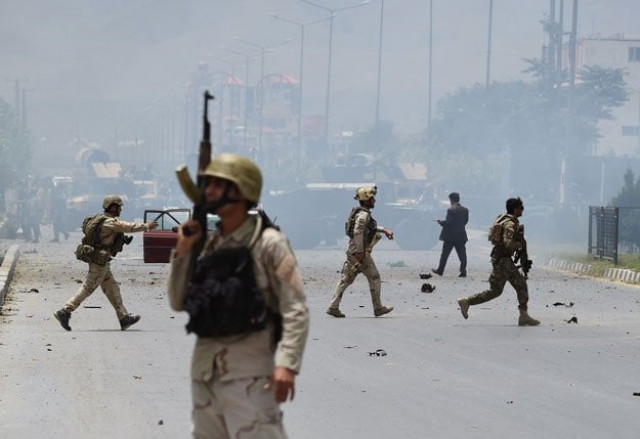The Afghan blame game
Both countries need to realise that the opportunities created by the recent warming of relations must not be wasted

Afghan security personnel take position at the site of an attack in front of The Parliament Building in Kabul on June 22, 2015. PHOTO: AFP

The waters are further muddied by claims that the attack was the work of the Indian intelligence agency RAW, and was designed to derail the improvements in the relations between Pakistan and Afghanistan. Specifically, to undermine defence collaboration and the much publicised intelligence-sharing agreement signed between the two countries in the last month. This particular claim cannot be overlooked outright.
All the claims, counter-claims and refutations regarding the attack on the Afghan parliament hint that whilst there is both desire and willingness at the highest civilian and military levels in both Afghanistan and Pakistan for an improvement in relations, at a lower level, inside government institutions, such pacifism may be lacking. The role of other regional players that may not be wholly pleased with the recent warming of relations between Afghanistan and Pakistan cannot be discounted either.
Add to this, the sputtering peace process that involves the Afghan Taliban, the Afghan government and the Chinese, with Pakistan playing the role of a facilitator and honest broker, it is clear that the road ahead is going to be bumpy. Not all regional players are on the same page, or even reading from the same book and not all have an equal investment in the peace process in the region. Those who do not, will try to knock it off course, with the result being events like the one recently witnessed, followed by accusations and counter-accusations. Both countries need to realise before it is too late that the opportunities created by the recent warming of relations must not be wasted.
Published in The Express Tribune, June 27th, 2015.
Like Opinion & Editorial on Facebook, follow @ETOpEd on Twitter to receive all updates on all our daily pieces.














COMMENTS
Comments are moderated and generally will be posted if they are on-topic and not abusive.
For more information, please see our Comments FAQ